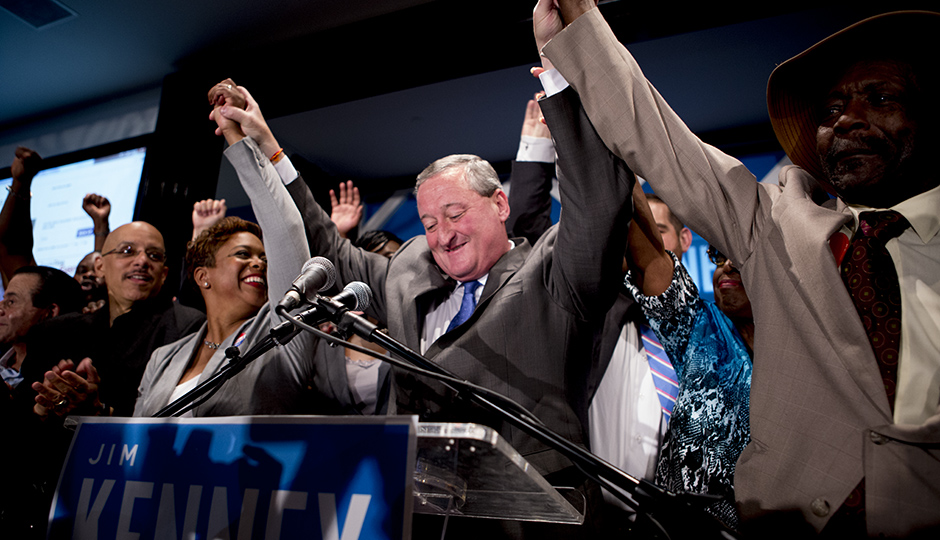The Brief: Jim Kenney and the Rebirth of Big City Liberalism

Big city liberals ascendant? | Photo by Jeff Fusco.
1. Kenney’s victory is latest in series of liberal City Hall wins.
The gist: The big east coast cities of New York, Boston and Philadelphia have all elected pronounced left-leaning mayors to replace the likes of Michael Nutter, Michael Bloomberg and Boston’s pragmatic Thomas Menino. The Inquirer’s outstanding Thomas Fitzgerald ties together those threads (he could have included Rahm Emanuel’s unexpectedly tough re-election fight against the liberal Chuy Garcia in Chicago).
Writes Fitz:
These mayors and others were elected by broad, cross-racial coalitions, on promises to address the economic frustrations of workers and to end racial disparities in law enforcement.
“Putting people ahead of big corporate interests isn’t just a winning formula for Philadelphia, it’s what millions of voters across our country will be looking for in the months and years ahead,” AFL-CIO president Richard Trumka said.
Kenney, for instance, vowed to raise the minimum wage, bolster public schools, and establish universal prekindergarten. He also highlighted his record of supporting LGBT rights and efforts to decriminalize marijuana possession, citing the disproportionate impact of drug laws on African Americans.
In New York, de Blasio highlighted his biracial family, promised to halt aggressive stop-and-frisk tactics in minority neighborhoods, and railed against the city’s increasing unaffordability for all but the very rich.
“The economy has recovered in many ways, but a lot of people have been left behind, and that’s more visible in cities,” said Anna Greenberg, the pollster for both the Kenney and de Blasio campaigns, as well as Gov. Wolf last year
Meanwhile, Will Bunch has a smart (though I think incomplete) take for the Daily News
For forty-plus years, Philly politics has slalomed between the slippery poles of knee-jerk law-and-order and rigid racial-identity politics. That created a city that remained firmly Democratic — yet was rarely progressive. And you don’t have to go back to the era when MTV showed music videos — just remember where City Hall was at just a couple of years ago …
Bunch says that era is over, epitomized not just by Kenney’s victory, but by Helen Gym’s as well.
What it means: Politically, there’s no question that Kenney’s romp represents a huge victory for the city’s unions and other progressive organizations and voters. There’s little question that big city voters are less enamored with centrist, pro-business CEO-types than they were in the very recent past. But has Philadelphia really entered a new progressive era? That seems hasty. Kenney has to win in the fall first (which he almost certainly will do no matter who opts to get in ). But he also has to govern like a progressive. Yes, this is the old Kenney, new Kenney drum that we keep banging. If the city gets new Kenney, Philadelphia might, as Bunch predicts, actually become a progressive city, instead of just a Democratic city. If it’s old Kenney, well, much remains the same — or slides back.
2. In Wilson Goode Jr.’s defeat Tuesday, City Council lost one of its most consequential members.
The gist: Four-term councilman Wilson Goode Jr., the namesake son of former mayor Wilson Goode, was defeated in Tuesday’s election. Some business leaders rejoiced, as the Philadelphia Business Journal reported:
“Wilson Goode never listened,” said Stradley Ronon Stevens & Young Chairman Bill Sasso, a former chairman of the Greater Philadelphia Chamber of Commerce. “I think it’s a good thing for Philadelphia that he’s out.”
The Greater Philadelphia Chamber of Commerce endorsed 13 of 15 City Council incumbents. One of those left off? Wilson Goode Jr.
Why it matters: Goode lost for a number of reasons. He had lousy ballot position. He basically doesn’t campaign for office, and he never has. He raises next to no money. The name “Goode” means less and less in a city that is growing younger.
But Goode’s ouster is a huge loss for Council and the city as a whole, and big business’s opposition to Goode is myopic and disappointing. He is actually the Council member most focused on economic development. He’s passed legislation that cut business tax rates. He’s successfully pushed for and got business tax credits to spur job creation. He favors business-friendly tax reform generally. So what’s big business’s problem with Goode? 1. He’s focused on equitable economic development, not just Center City development. 2. He opposes the 10-year tax abatement, which he believes sucks badly-needed cash out of the School District largely to benefit Center City developers and wealthy home buyers. For that heresy, he had to go.
And so the city has lost a Councilman that pioneered campaign finance limits, increased funding for city schools, harried multiple administrations into fixing the city’s problems with minority contracting programs and generally served as one of the most-informed and engaged members of Council for the last 16 years.
3. The day after, mayoral nominees Jim Kenney and Melissa Murray Bailey ate lunch at Broad Street Ministry at an anti-poverty fundraiser, instead of the traditional post-election power spot, the Palm.
The gist: Writes the Daily News:
After a resouding win in the Democratic mayoral primary, Jim Kenney mingled with Gov. Wolf, Republican challenger Melissa Murray Bailey and area homeless.
Kenney joined a mishmash of political elites and poverty-stricken locals at a luncheon and fundraiser at Broad Street Ministry, in Center City. The luncheon, which was free to attend, was Kenney’s and Bailey’s first postprimary election event.
BSM board co-chairman Richard Keaveney praised Kenney for celebrating his primary victory with a fundraiser instead of a ritzy lunch.
“You have made a principled choice to be here among the people,” Keaveney said.